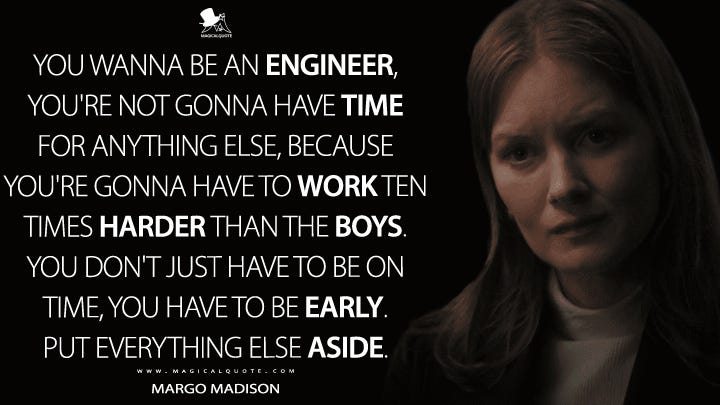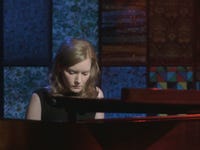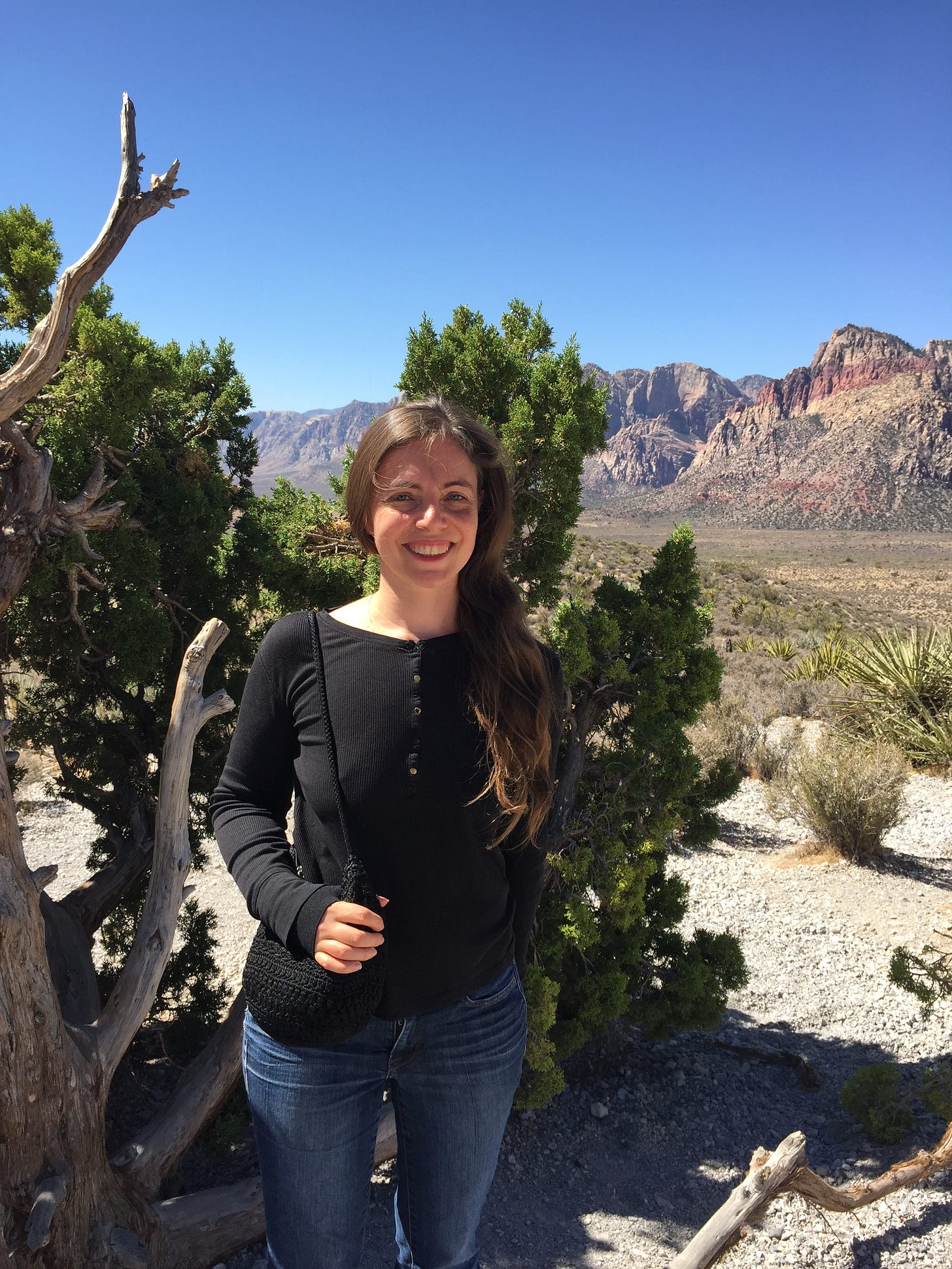Curious Realizer - the contrasts between day jobs and creative work
Featuring some thoughts from a risk management professional who discovered a creative outlet later in life
I’m going to start this post with a bit of a spoiler about the TV series For All Mankind but it’s not a major spoiler and it’s a interesting example of the subject of today’s post.
In For All Mankind, Margo Madison is an engineer on the Apollo space program who eventually becomes NASA's administrator. She is a workaholic, even living in her office for years.
But she maintains a dual identity of sorts: she is a gifted jazz pianist who performs in night clubs.
But Margo guards this secret closely from her colleagues. It's a part of her life that she refuses to share with anyone else, a secret that belongs to her and her alone. Her piano playing is a refuge from her daily responsibilities and it’s also highly likely - given her profession and the stereotypical expectations of women in the mid 20th century - that her hobby could be seen as a diversion from her career and a weakness to be exploited.
Margo’s obsession with privacy displays one extreme of how professionals balance personal and professional lives, quite often with hobbies and aspirations that are very different from their day jobs. In other cases, like the person I’m featuring in this post, there’s more possibilities for professionals to use their creative talents and share them with the world.
is a risk management professional who regularly publishes the newsletter, which builds on her learnings from her career. But Stephanie made an interesting choice in the past few years, a Margo-like pivot to add singing to her toolbox of skills. Stephanie answered a few questions for me and her answers are below.What experience did you have with music as a child moving into adulthood? Any formal lessons on any instrument (including your voice)?
On my fifth birthday, a piano arrived at my house. I took lessons starting then until I left for college and left my piano behind! I mostly liked playing show tunes (like "The Phantom of the Opera") and rock songs (like "Stairway to Heaven"), since I could learn them and then play them really well, though I wasn't good at sight-reading. I also shirked music theory, which has now come back to haunt me! I brought a keyboard to my dorm and tried the piano practice rooms at college, but eventually drifted away from music as I started my career.
Funnily enough, I thought for most of my life that I couldn't sing well. In fifth grade, I was cast in the class musical Oliver Twist. I had three notes to sing ("Who will buy"?), and they were super-high, and I just couldn't project loud enough for the audience to hear me. So no one heard me, and the music teacher was annoyed, and I started losing confidence. After that, I was a quiet choir singer through school but always in the background, never thinking I could make myself heard. Whenever I tried to sing loudly, it was off-key and terrible. I never took private voice lessons as a kid, so I never learned about the mix voice or chest voice or other techniques until way later.
What was the underlying emotion that pushed you towards singing in middle age? Desire? Fear? Anger? Stubborn determination? Was the karaoke experience the spark or was it what carried you through?
It was 2016. Our work project leader took us to dinner and then to this zebra-striped '70s-style karaoke lounge called Planet Rose on Avenue A in the East Village. I'd always wanted to be good at karaoke but had no idea how to sing loudly and on-key simultaneously. My default song was "These Boots Are Made for Walkin'" since it's the easiest song on Planet Earth. But time went by, and we had wine. I sang "Boots" and it wasn't world-shatteringly awful, but then it was my turn again and I don't remember what I sang next, but I know it was bad. Embarrassing. And we weren't in a private karaoke room, since this place had none, so the entire bar full of New York strangers also knew it was bad. It was kind of a nightmare and it went on for hours, and I was surrounded by work people who I typically try to impress, but this was not impressive in any way.
I left feeling upset but also wondering if maybe singing, like any other skill, wasn't just some innate angel-gift landing on the shoulders of divas but something that could be learned. At least to the extent that I wouldn't feel embarrassed like that again. I did some Googling and found New York Vocal Coaching, which had a friendly website stating that only a tiny percentage of people are truly tone deaf, and most people can learn to sing at a near-professional level. I sent them this note:
"My dad has an amazing voice; it pours out of him even untrained and he could have been a '50s crooner. My mother... does not. I have never been able to find my voice. I sung in a choir in high school and was one of those background, soft, head voices. I never figured out where my chest voice even is or how to project, but when I try to use it I think I sound flat, off-key, and awful. I would like to know if there is a reasonably good voice in there somewhere, and be able to sing a repertoire of about 10 karaoke songs without embarrassing myself so that I can have fun with my voice."
Have you taken formal voice training since taking up the hobby? How do you build up your skills?
A couple of weeks after the karaoke debacle, I showed up for my voice lesson with David McCall, who I chose because his reviews gave the impression he was kind and forgiving. He thought I could learn to sing, and I trusted him, and I'm so glad I did! We discovered that I had a big range of 3.5 octaves but had poor control over it. And he stuck with me through those first lessons, when I'm sure I sounded like a dying cow as I unearthed my chest voice and struggled to understand what the mix voice even was (it's a blend of chest and head voice that requires practice). And, gradually, I started to relax and gain confidence.
A few months later I ventured to a karaoke bar to test my new skills. I chose a place I'd never been and would never have to visit again in case things went badly. But, to my surprise, it went reasonably well--I sang some easy-for-me songs and got some compliments--and I found myself returning. Singing had gone from confidence-killer to confidence-builder. And it was also empowering to have taken an embarrassing situation and turned it around, so it became a hobby that gave me joy.
To be clear, I wasn't a good singer at this point. I kept thinking I should belt it out, or push the gas pedal constantly through a song, or strive to hit high notes, rather than just relaxing into my voice. But I wasn't terrible, and I was practicing, just like I'd practiced piano in childhood.
I found a couple of karaoke places that would rent me a private room for low per-hour rates during weekend afternoon off-hours, and I started to practice more. Just singing all sorts of different songs in different genres, testing my range, playing around, figuring out what types of songs fit my voice. Kind of like trying on clothes.
Then the pandemic happened and I couldn't go to karaoke places anymore. When I thought about practice rooms all I could envision was a sea of invisible coronaviruses possibly emitted by prior singers. I tried some in-home karaoke apps but it felt sad and lonely. So I started thinking, "Maybe I can sing well enough at this point to turn some of the lyrics I wrote into songs." I had a few melodies in mind, and I'd met a producer years earlier through my voice teacher, though I hadn't been a good enough singer to make it work back then. I emailed the producer, Dax Dupuy, and she was game to try again, and this time around it worked!
How did you record songs remotely during a pandemic?
Our process goes like this: I record a rough cut of myself singing a couple of songs and send it to her as a Logic Pro file, and we pick one. Then I work out the notes, chords, and some harmonies on a MIDI keyboard and send it, also as a Logic Pro file. She's a master at using Logic Pro, and I've taken some basic lessons, so she sets up the recording file. We have a call to discuss what instruments we want to use, since Logic lets you choose among hundreds of instruments and she has better plug-ins than I do with more options. Once we have an instrumental skeleton, we work on developing the terrain (things like, "This verse should be louder and that one softer," "Can we use those cello harmonies in this verse too?", "That twanging percussion sounds distracting now," "Cool flourish here," "Let's add another measure here").
Then I record the vocals into Logic. I literally do it in a walk-in closet full of clothes, using a Shure SM7B microphone, a Cloudlifter, and an M-audio interface connected to my laptop, along with some studio headphones. It's a simple setup with a high-quality microphone. I'd love to record in a studio someday, but my DIY bedroom closet setup has been good enough to get me started and create songs that get some coverage on blogs, playlists, and radio.
Even in this low-stakes home recording environment, I still get keyed up and tense thinking stuff like, "This is going to be out there forever, and I'll have to live with it if I don't get it perfect." My old fears about sounding bad flood back. And when you're tense, you don't tend to sing well. So a lot of my effort goes into trying to relax. I do a lot of takes over the course of several days and don't listen to any of it until I'm done. Sometimes I sing in weird postures. Maybe I'll close my eyes and imagine I'm on a Broadway stage, or I'll kneel and imagine I'm in a forest beside a campfire. With "Throwing Darts at the Universe," I recorded a lot of takes sitting on the floor, leaning back, and pretending I was drinking and singing with a friend. Those takes came out great! Relaxing is the key for me, and I do what I need to do.
Then I listen to all the takes, winnow down to the best two for each section of the song, and send the selected vocals to Dax for mixing and mastering. We listen to the result and make final tweaks, and then I upload the final file to a distributor and it's out into the world! The most rewarding thing for me is getting compliments about the vocals from curators on Submithub (a website for seeking blog, radio, and playlist coverage in the music world) and from people who stream the song and then contact me. My strength is in writing songs, but it's been such a journey to reach this point with singing. My newest song, "Throwing Darts at the Universe", is here:
The next hurdle is live performance. That's about the least relaxing thing I can imagine. But I also really want to try it. So, I'll be getting a bigger keyboard and practicing singing and playing simultaneously. And someday, when I feel like I'm capturing the spirit of my songs, even if it's not perfect, I'll give it a shot.
Is your singing hobby a reaction to your day job and the desire to have a more fulfilling life?
It's not a reaction so much as something I've always needed. Before songwriting, I was writing sci-fi and fantasy and making visual art centered on poetry. If I don't have a creative outlet, my left-brained work suffers too, because I spend too much time focused on what I'm not making and feeling upset and dissatisfied about that. Whereas if I'm making my own creative work, even on the side, that satisfies me so I can also focus fully on my left-brained work during work hours. Then I'm firing on all cylinders, and all my work gets better, both left-brained and right-brained.
In the TV series For All Mankind, the female character who becomes NASA's administrator is a gifted pianist who performs in clubs but guards this secret, like it's a part of her life that she refuses to share with anyone else, like having a "thing" that belongs to her alone. Can you identify with that at all with your music hobby (do you guard this talent from other people)?
In a way, I'm a compartmentalizer; I don't feel the need to bring my whole self to work. Just like I wouldn't bore fellow musicians with a long and winding soliloquy about risk dashboards, there's no call for dragging my risk management colleagues into a deep-dive on songwriting. We're all different people with different interests. So, it's not a secret, but I don't need to talk about it all the time either, especially if I feel it's not a receptive audience.
But sometimes the right moment arises. At an information security conference a few years ago, the ice-breaker was, "Share something counterintuitive." I said, "Almost anyone can learn to sing," and several people wanted to talk more after the session. Some people share that wish or dream, and it's true: singing is physics, how you move your mouth and throat and tongue and breath to produce sound is a learnable skill (to some degree; I'm not saying you can learn to sing like Mariah Carey or Freddie Mercury). And that's inspiring. It sparked a journey for me at an unexpected time in my life, and I'm grateful for that.
It’s great to see that Stephanie found a way to develop her creative side, even during the pandemic challenges we all faced this decade. You can find out more about her work via her Instagram account.
Maybe Stephanie’s story will inspire you to move forward with your own creative idea.







Really inspiring. I'm so glad that Stephanie took the steps to overcome her lack of confidence. She has a lovely voice, and that music teacher ought to have been doing something else to earn a living.
A. I love For All Mankind!
B. What a great observation from the show to pull out and explore (obviously I love exploring real life through fiction, so you had me from the outset, but I enjoyed it all the way through)
C. As someone who has a tendency to turn every interest and skill into a job and has been thinking a lot about picking up a for-nothing-else-and-no-one-else hobby, I am fascinated by the idea of intentionally keeping it a secret. I think Elizabeth Gilbert also talks about this....